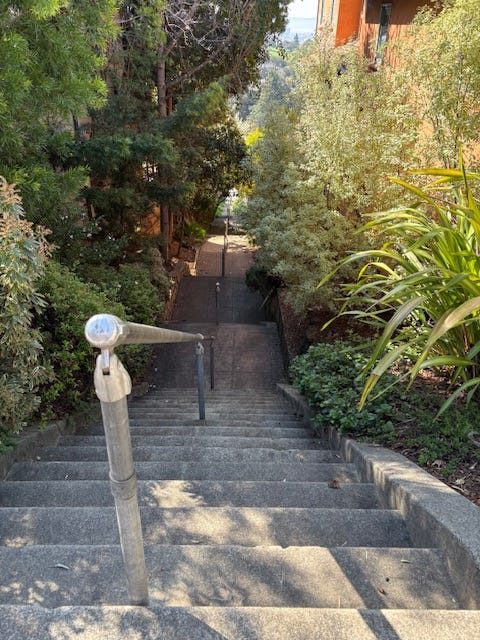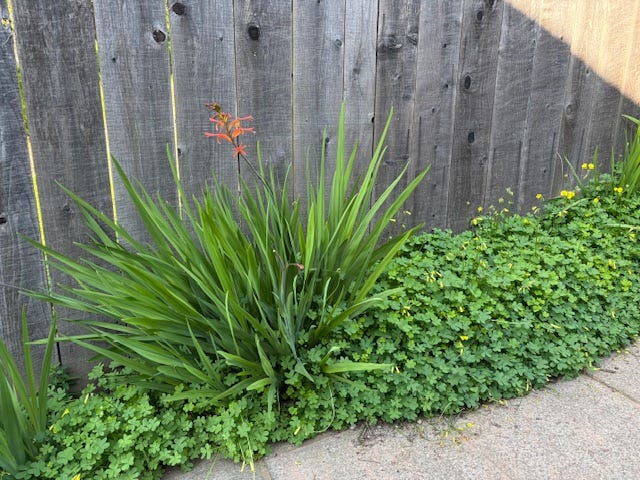That Sinking Feeling: Adventures in ADHD and Ship Salvage is my podcast about my son’s ADHD seen through the lens of my Dad’s ship salvage career. The podcast project took inspiration from an unpublished book manuscript I completed in 2022. The essay below (written in 2023) is an adaptation of a chapter from the manuscript.
Love, Parenting, and ADHD
We are supposed to be running stairs together, but by the time I tighten my shoelaces, Steve’s taken off. It’s not a race, but my husband has a competitive streak, always pushing himself to do more; more pull-ups, a higher bench press a weight, more sets of stairs. I know I’m not supposed to feel defeated before we’ve even started, but it’s hard to motivate myself to catch up with him. In part because I know I never will.

The Oakland hills are full of odd, semi-hidden staircases that connect streets and neighborhoods. This particular path is one of the wider sets of stairs, first climbing a block between houses and empty lots, with long landings between small sets of stairs. Then crossing a street before the stairs steepen dramatically, I’m grateful for the steel handrail down the middle, something to grab and pull myself upwards when I’m seriously depleted. Steve usually does both sets of stairs twice, and then just the upper section a bunch of times. He likes that it’s more concentrated, more intense. When I finally reach the top, he’s already at the bottom again. I take a seat and wait for him to return.
Steve and I are here to get exercise and to be outside. But we’re also here because our therapist suggested we find new ways to spend time together. The prescription is simple: do things together to help repair our modestly cracked relationship. There’s only one rule: we can talk about anything but our younger son, Owen. It’s a good guideline, but I am the one most prone to breaking it.
Our son, Owen, was diagnosed at ten with ADHD and later with anxiety and depression. He is bright, talented. Teachers have always noted his extensive vocabulary and keen insight. But he has developmental delays in basic social skills. He is quick to anger, struggles to control frustration, and even to understand his own emotions. In preschool he threw a chair at a student and bit a substitute teacher. As he has grown-up, the frustration has become more verbal than physical, more internal and self-destructive. His organizational skills have been slow to develop. He puts off doing homework because tomorrow is not today, and it is easier to avoid problems than to engage in solving them. He finds himself easily overwhelmed by everyday tasks – brushing his teeth, showering, tracking his spending habits, doing household chores. For years he seemed to find coping strategies that helped him get through the day. As a high school student schooling remotely through COVID, those tactics stopped working, and it caused tension throughout our household.
Steve and I both want the same things for Owen – to finish high school, to go to college, to be independent and happy – but we disagree on how best to help Owen get there. I want Owen to go to therapy, to work with an ADHD coach, and to get academic tutoring support. Steve wants to buy Owen time, to give his brain time to develop and mature. I keep saying we’re running out of runway. Steve thinks we need to build a longer one.
The ugly truth is that I find it hard to fully accept that Owen isn’t trying to be difficult, but that everything is just harder for him. I keep saying things like: I understand he’s struggling with making basic choices, but don’t understand why it’s so hard for him to do his homework. It is, in part, why I finally started seeing my own therapist, to try to emotionally grasp that despite all my best mom intentions, it’s not my job to change our son. And yet, I still struggle to let go of my expectations, my let’s-change-Owen-for-the-better campaign, like when I insist Owen clean his room, do laundry, and scoop the cat litter. Sometimes Steve acts as the go between, relaying my requests to Owen, getting him to do things. But, more often than I’d like, Steve firmly asks me to back off.


Steve’s never been diagnosed with ADHD, but he paces while he’s on the phone, absent-mindedly chews pen tops to help him stay awake through long meetings, and struggles with auditory processing. Which is, perhaps, why he intuitively relates to our son’s procrastination and understands why my long list of to-do-items overwhelms Owen. It’s in our couple’s therapy sessions that I begin to understand Steve defends Owen not just because he’s a kinder, more empathetic parent, but because he commiserates with him in ways I struggle to understand.
Steve and I are barely speaking when we decide to run these stairs. We’ve been bickering, not about our goals for Owen, but about how to help him. It’s the same impasse we bump up against on an almost daily basis that we can’t seem to overcome. I'm asking for changes from Owen that would put him on par with his peer group. Steve thinks it’s too much and that I'm insensitive to Owen’s mental health challenges. I’m not exactly sure that running stairs was what our therapist had in mind when he told us to spend time together, but here we are.
When I first met Steve in graduate school, we spent time running through the Covell Greenbelt, a series of parks and meandering paths near UC Davis. I liked his company, our friendly banter about everything from politics to academia, and his words of wisdom about teaching public speaking to undergrads (something he already did and something I was getting ready to do the next quarter). I didn’t love the running but cherished the way that being outdoors cleared my mind. And, of course, I eventually fell in love with him, lost car keys, misplaced sunglasses, gnawed on pens, and all.
Steve reaches the top landing and takes out one of his earbuds. I can just make out the words for the chorus of New Order’s Blue Monday.
“You doing another set?” he asks.
“Maybe.”
I’m exhausted. I’ve already done 3 sets, 600 stairs.
I pass Steve the water bottle. It’s hot. We should have each brought our own drink.
“I’ve got two more sets. That’ll make it 1200,” he tells me. “Do another. It’s good for you.”
I peer down the stairs.
“Come with me,” he says.
Two at a time we descend the concrete stairs. After the first 30 steps, he turns around and goes back up.
“Keep going,” he says. “I’ll catch up,” he calls over his shoulder.
Steve does this to me all the time. Doubles up, passes me, literally running circles around me. It might be demoralizing to some, but I’m okay with it because I know he’s stronger, motivated to get in more steps, more flights, more calories burned. But the figurative circles he runs round me in my comprehension of Owen’s ADHD? That’s a different matter altogether.
This summer we celebrated our 25th wedding anniversary. We’ve been together almost 30 years. It’s a long time of dating, knowing one another, and learning to parent. When we first met, another grad student told me to get his handy-dandy study guide for a class that had a reputation for being tough. “He’s smart,” everyone said, and I knew from the way they said it that they found his intensity a bit overwhelming. The go-to guy who could easily explain obscure rhetorical theories or data results from a communication study, he effortlessly grasped things the rest of us struggled to comprehend. He had a breezy way of sharing insights that made us wonder how he knew so much. And he could do this for almost any topic. Mention something about the Second World War and he could wax eloquent about armed forces, supply line resources, and offensive strategies in either Eastern Europe or the Asia-Pacific rim. Mention an article you read about airline safety, and he might share stats about landing and takeoff studies. While some found Steve intimidating, I found him intoxicating. Smart, cute, sweet, cuddly – he was everything I wanted in a partner. I still love that about him, but now I am jealous and angry that he understands Owen in ways that perplex me. I’m the one that reads news articles and personal essays about ADHD, watches videos by ADHD influencers, orders books written by experts, and attends parent workshops. I should be the one explaining everything to him. And still, he’s miles ahead of me. I feel as though I’ll never catch up, never understand our son in the way that he seems to so easily “get” him.
As I step off the stairs and onto the street landing, Steve leaps over the last three steps, stands next to me, and puts his arm around my waist.
We share a quick kiss. I look at the time on my phone and think about getting home to start dinner. I watch him look upwards. I know that look. The glimmer in his eye that he wants to sprint up the stairs for one last set. And then because I’m staring at Steve’s stubble and because I’ve been ruminating about Owen, I ruin the moment by asking, “Can you please get him to shave tonight?”
“You just can’t help yourself, can you?” he asks. It’s a question, but really more of a statement.
It’s true. I can’t. I can’t seem to just let us just enjoy this moment. This outing. This respite from the daily nagging, the requests that will make everything magically different, but never do.
Plus, I’ve broken the cardinal rule to not talking about Owen.
“Yes,” he tells me, "but now you need to run this last set with me.”
Steve holds out his pinky. He knows I won’t hold his whole hand; I’ve got my own sensory issues. Together we begin to climb.
Endnotes
Join me on Instagram! I post mini-book reviews, artsy photos, short videos, helpful bits of ADHD insight, and select pieces of shipping and maritime news.
You can also find me on Threads and BlueSky.
That Sinking Feeling: Adventures in ADHD and Ship Salvage is streaming wherever you get your podcasts, including Apple, Spotify, Pandora, and even YouTube!
You can find my book, Chasing Portraits: A Great Granddaughter’s Quest for Her Lost Art Legacy in libraries all over the world! The book is officially, as they say: Out of Print.
Use my contact form to purchase a copy directly from me. $20/book. I can ship via media mail anywhere in the U.S.
The Chasing Portraits documentary film is streaming on Amazon, iTunes, Kanopy, and OvidTV. You can also buy the DVD directly from distributor First Run Features.
If you’re looking for other documentaries, narrative films, or TV shows featuring the subject of Holocaust era looted art… I’ve got a list for that!





thank you for the repost :-)